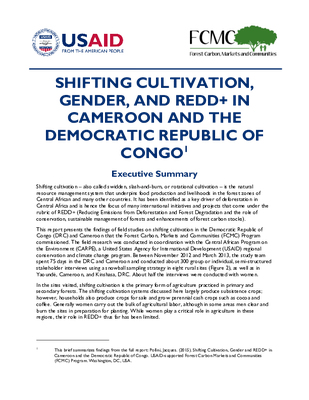Shifting Cultivation, Gender and REDD+ in Cameroon and the Democratic Republic of Congo - Brief
This report presents the findings of field studies on shifting cultivation in the Democratic Republic of Congo (DRC) and Cameroon that the Forest Carbon, Markets and Communities (FCMC) Program commissioned. The field research was conducted in coordination with the Central African Program on the Environment (CARPE), a United States Agency for International Development (USAID) regional conservation and climate change program. Between November 2012 and March 2013, the study team spent 75 days in the DRC and Cameroon and conducted about 300 group or individual, semi-structured stakeholder interviews using a snowball sampling strategy in eight rural sites (Figure 2), as well as in Yaoundé, Cameroon, and Kinshasa, DRC. About half the interviews were conducted with women.
https://biodiversitylinks.org/projects/completed-projects/forest-carbon-markets-and-communities-fcmc-project/resources/shifting-cultivation-gender-and-redd-in-cameroon-and-the-democratic-republic-of-congo/view
https://biodiversitylinks.org/projects/completed-projects/forest-carbon-markets-and-communities-fcmc-project/resources/shifting-cultivation-gender-and-redd-in-cameroon-and-the-democratic-republic-of-congo/@@download/image/image.png
File
Shifting Cultivation, Gender and REDD+ in Cameroon and the Democratic Republic of Congo - Brief
This report presents the findings of field studies on shifting cultivation in the Democratic Republic of Congo (DRC) and Cameroon that the Forest Carbon, Markets and Communities (FCMC) Program commissioned. The field research was conducted in coordination with the Central African Program on the Environment (CARPE), a United States Agency for International Development (USAID) regional conservation and climate change program. Between November 2012 and March 2013, the study team spent 75 days in the DRC and Cameroon and conducted about 300 group or individual, semi-structured stakeholder interviews using a snowball sampling strategy in eight rural sites (Figure 2), as well as in Yaoundé, Cameroon, and Kinshasa, DRC. About half the interviews were conducted with women.


